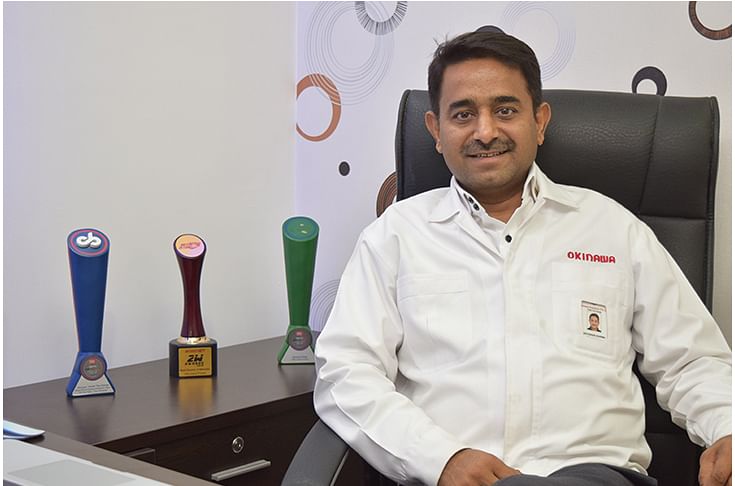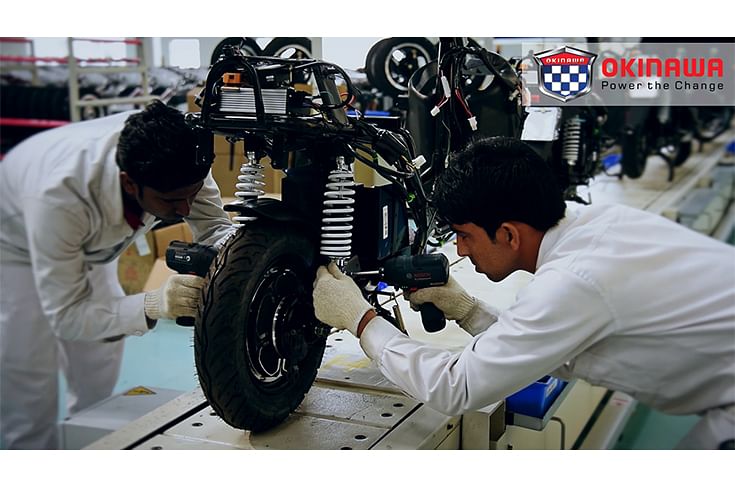Okinawa Autotech restarts operations, reschedules maiden e-motorcycle launch
The EV maker has restarted operations, but business may take some time to pick up as customers may not flock showrooms soon.
Okinawa Autotech, a key player in India’s emerging electric two-wheeler industry, restarted its operations earlier this week. All operations in its corporate office, manufacturing unit, and dealerships will be manned by 25 percent of the staff strength.
According to the company, all products will be sanitised before getting dispatched from the plant and dealer partners will sanitise them again on receiving them. Thermal screenings will also be conducted at all Okinawa dealerships, as per the government advisory. A sanitisation tunnel for individuals has also been installed at Okinawa’s plant in Bhiwadi, Rajasthan.
The EV maker has restarted operations, but business may take some time to pick up as customers may not flock showrooms soon. According to Okinawa Autotech, the electric two-wheeler market may have lost around 20,000 units of sales during the full lockdown period. The COVID-19 led lockdown has also caused a delay of at least some of Okinawa Autotech’s plans. Key among them is the launch of its first electric motorcycle. The Oki 100, as it is called, is also being pitched as a fully made-in-India product.

“Okinawa’s first electric motorcycle will be a 100 per cent localised product. Initially, the plan was to launch it in the second quarter (Jul-Sept),” says Jeetender Sharma, founder and MD, Okinawa Autotech. The motorcycle will now be launched in the third quarter of the year. A cruiser styled electric scooter is being planned for market introduction in 2021.
Playing the ‘local’ card
As two-wheelers increasingly play the lead role in driving the Indian electric mobility industry, Okinawa wants to be a lead player in offering fully indigenous products. “We have submitted number of titles for IPR including micro processor controller, permanent magnet BLDC motor, NMC (nickel, manganese, cobalt) Lithium ion battery with battery management system,” says Sharma, an engineer and a former executive at Honda Motorcycle & Scooter India.

Okinawa’s R&D journey began around 5 years ago. Its first product, a scooter with lead acid battery technology, was launched in 2017. Some of its scooters, with Lithium-ion battery technology now, have a claimed riding range of almost 140 kilometres in a single charge. Even though on one occasion an Okinawa product was found strikingly similar to a Chinese electric scooter, Sharma wants to build Okinawa Autotech as a deserving example for the support for local products and services that Prime Minister Narendra Modi appealed for, on 12th May. Currently, the localisation level of his products is at around 88 percent. While the list of EV parts manufactured locally by the component industry is growing, battery cell production is still zero in India. Sharma is hopeful that an upcoming 40 GW Lithium-ion battery plant in Telengana will help address this gap. “There are other companies that have made investments in this sector to localize components. Once, these plans materialise, there will be a strong supply chain in place which will help reduce the cost of product significantly. This will eventually result in wider adoption of electric vehicles in India,” says Sharma while adding that “a stronger government push” is also required to have fully locally made electric vehicles (EV) in India.
The government has extended incentives to promote adoption and local production of EVs under the FAME policy, but industry sources say they are not yielding the full intended benefits yet. For instance, low speed electric scooters (top speed of 25kmph), which do not attract FAME 2 subsidy, contributed 90 percent of all electric two-wheeler sales in 2019-20. During the last financial year, the Indian EV market (excluding electric 3-wheelers) saw a 20 percent growth in sales volume to 156,000 units. 152,000 of them were two-wheelers. This trend and the opportunities ahead appeal to entrepreneurs like Sharma, who are yet to secure major gains on their investments. To keep the dealer partners in the game and have their support too, Sharma hiked the margin for Okinawa dealers from 8 percent to 11 percent recently.
RELATED ARTICLES
Cosmo First diversifies into paint protection film and ceramic coatings
The Aurangabad, Maharashtra-based packaging materials supplier is leveraging its competencies in plastic films and speci...
JSW MG Motor India confident of selling 1,000 M9 electric MPVs in first year
The 5.2-metre-long, seven-seater luxury electric MPV, which will be locally assembled at the Halol plant in Gujarat, wil...
Modern Automotives targets 25% CAGR in forged components by FY2031, diversifies into e-3Ws
The Tier-1 component supplier of forged components such as connecting rods, crankshafts, tie-rods, and fork bridges to l...






 16 May 2020
16 May 2020
 10531 Views
10531 Views





 Autocar Professional Bureau
Autocar Professional Bureau




